By CDR Christopher Nelson, USN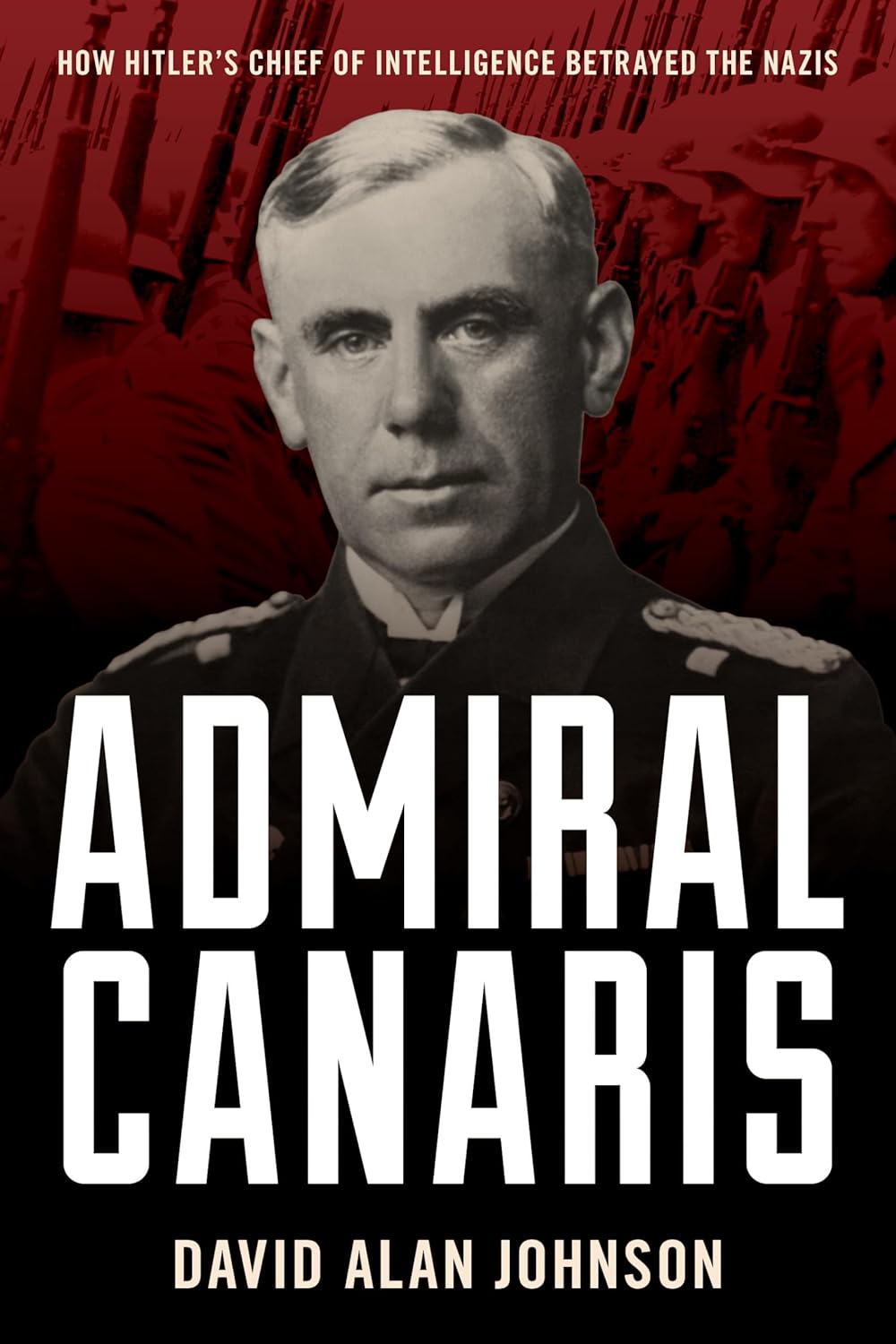
Author David Alan Johnson discusses his new book, Admiral Canaris: How Hitler’s Chief of Intelligence Betrayed the Nazis. It is a well-written synthesis of the life of Admiral Wilhelm Canaris, who served as the chief of military intelligence for Nazi Germany from 1935-1944. While Canaris might be less well-known than some of the more senior Nazi officials from World War II, his unique position and acts of sabotage make him among the most consequential resistance leaders during the war. Admiral Canaris’ excellent skills in deception, subterfuge, political infighting, along with his eventual distaste that turned into hatred of Hitler’s regime, make for a fascinating story.
To begin, provide us with a brief biographical sketch of Admiral Canaris. How do we place him in context among other Nazi and Wehrmacht leaders?
In common with the majority of German leaders during the Hitler era, both political and military, William Canaris had an excellent record as a junior officer during the First World War. He received commendation both as an active officer with the fleet and as an intelligence officer. He was presented with the Iron Cross 1st Class by Kaiser Wilhelm. Most of the leaders of the German forces were also decorated veterans, including Adolf Hitler. Canaris hated the Weimar Republic and the Treaty of Versailles. To Canaris’ way of thinking, the Weimar Republic was a foreign administration that had been forced upon Germany by the Allied powers, and the Versailles Treaty severely limited the size of the German navy and prohibited the building of submarines – Canaris had been a submarine commander during the war. When Hitler became Führer during the 1930s, he promised to re-arm Germany which included rebuilding the German Navy. Along with all other high-ranking German officers at the time, Wilhelm Canaris was in complete agreement with Hitler and his plans for a New Germany. Adolf Hitler was a strong-willed German nationalist who planned to form a new government in Germany, abolish the Versailles Treaty, and create another German fleet, complete with submarines. As far as Canaris was concerned, Hitler was exactly what Germany needed.
What specifically led to Canaris taking charge of the Abwehr – German military intelligence?
Wilhelm Canaris had been the intelligence officer aboard the cruiser Dresden during the First World War, which gave him a working background in that field. But his first link with the Abwehr came in 1934, when he was captain of the battleship Schlesien. Captain Canaris did not get along with his immediate superior, Rear Admiral Max Bastian. In an effort to get rid of Captain Canaris, Admiral Bastian recommended that Canaris be assigned to an administrative post – possibly the Abwehr. But instead, the German admiralty sent Canaris to Fort Sweinemünde, a seaport on the Baltic Sea coast. This turned out to be a dead-end job; Canaris was not happy with this assignment.
But less than a month after reporting for duty at Fort Sweinemünde, Canaris became the beneficiary of a happy accident – the head of the Abwehr, Captain Conrad Patzig, resigned his position because he was not able to get along with the director of the newly-created Sicherheitsdienst (SD), the ambitious Reinhard Heydrich. Before leaving his position, Captain Patzig recommended that Wilhelm Canaris replace him as the Abwehr’s director. Canaris not only had the qualifications for the job but, just as important, he had been friends with Reinhard Heydrich back in 1923, when Heydrich had been a 19-year-old naval cadet aboard Canaris’ training ship. Wilhelm Canaris became the Abwehr chief because of several coincidences. He became the official head of the Abwehr on January 1, 1935.
What made Canaris an exceptional intelligence officer?
Captain Conrad Patzig, Wilhelm Canaris’ predecessor as head of the Abwehr, noted that he did not know of anyone else who had Canaris’ talent for deception and subterfuge – two vital attributes for an intelligence officer, especially in wartime. During the First World War, when he was intelligence officer of the cruiser Dresden, Lieutenant Canaris informed a radio station in Brazil that the Dresden would soon be returning to Germany. He knew that this message would be picked up by British Intelligence. But the Dresden did not go back to Germany; she continued to operate in the vicinity of Montevideo, Uruguay. British Intelligence did not discover the ruse until the Dresden sank two British merchantmen off the coast of Uruguay. The Dresden’s captain was happy to learn that his young intelligence officer had such a talent for duplicity. Canaris would go on to use this talent against Hitler and the Nazi regime in years to come.
How did Canaris balance the Abwehr’s intelligence work with the Nazi Gestapo and Security Service?
He did not “balance” his intelligence work with the other agencies. He basically set out to confuse Hitler and his generals by sending reports that invalidated information supplied by other agencies. This not only served to confuse the high command, but also led to Hitler losing faith in his intelligence services in general. His first opportunity to mislead Hitler came early on during the war, in September 1939. Admiral Canaris advised Hitler that French troops and artillery were gathering in the vicinity of Saarbrücken, which indicated that a French offensive would be taking place nearby. This news took Hither completely by surprise. He replied that he could not imagine a French attack anywhere near Saarbrücken. German defenses were particularly strong in that region, he said, and refused to believe the admiral.
Hitler’s opinion of Canaris would continue to deteriorate as the war went on and Canaris continued to make intelligence “mistakes.” He withheld information regarding “Operation Torch,” the Allied invasion of North Africa, which took place in November 1942. A task force of British and American warships and troop transports sailed right through the Straits of Gibraltar and landed on the North African beaches without the German High command knowing anything about the landings in advance. By the spring of 1943, all Axis forces had either surrendered or had been withdrawn from North Africa. A little over a year later, in January 1944, Admiral Canaris also contributed to the success of the landings at Anzio. He informed Feldmarschall Albert Kesselring that there was no need to fear an Allied invasion anytime in the near future. At that exact moment, about 250 British and American ships were approaching the town of Anzio on the western coast of Italy, carrying 50,000 men of the US Fifth Army and the British Fifteenth Army Group. Anzio was one of the largest amphibious operations of the war. Because of these apparent blunders, Hitler and his generals had lost all faith in the German intelligence services, not just in Admiral Canaris. Canaris had misled and misinformed them too many times.
Let’s dive into the reasons Canaris changed his mind about Hitler and began to subvert Nazi policies and goals. Canaris, initially it sounds, believed stridently in German nationalism and was a supporter of the Nazi regime. But he changed. What happened?
Admiral Canaris’ support of Adolf Hitler and the Nazi regime began to change during the early part of 1938. This change of heart was brought about by two separate incidents. The first incident involved the deliberate disgracing of Hitler’s highest-ranking general, Werner von Blomberg. General von Blomberg had recently married a much younger woman, Erna Gruhn. Because of von Blomberg’s position as Minister of Defense, the wedding was a leading social event; Adolf Hitler himself was one of the wedding guests. A short time after the wedding, Erna Gruhn was discovered to have quite a vivid police record – she was a convicted prostitute and had also been a model for pornographic photos. When Adolf Hitler was told of this, he was livid with anger, but he also realized that this incident created an opportunity for himself. He demanded von Blomberg’s resignation on the grounds that he had committed an immoral act by marrying a prostitute. After the general submitted his resignation, Hitler assumed his title of Defense Minister. Hitler had been looking for an excuse to solidify his control over the armed forces; the von Blomberg scandal gave him a ready-made excuse. General von Blomberg resigned in January 1938; Adolf Hitler immediately replaced him as supreme commander.
At the same time as the von Blomberg incident, the Wehrmacht’s commander-in-chief was removed from his post as the result of another scandal – this one was completely fabricated. General Werner von Fritsch did not agree with Hitler’s aggressive policy toward the Soviet Union. He was afraid that Hitler’s belligerence would lead to war with Russia, a war he knew Germany could not win. Hitler did not appreciate von Fritsch’s opposition, and decided that the general had to be dismissed from his post.
The method used to dispose of General von Fritsch was both simple and brutal. He was charged with having homosexual relationships, which was a criminal offense in Nazi Germany. A witness testified before both Adolf Hitler and Hermann Göring that von Fritsch had a homosexual affair with a young boy in Potsdam. General von Fritsch vehemently denied the charge, and was allowed to be tried by a court of honor. The trial acquitted him of all charges, but the scandal ruined his reputation and ended his career – just as Hitler had planned. The accusations had been a complete set-up. It had been a different Captain von Frisch who had the homosexual affair, not the General von Fritsch. Hitler and the Gestapo knew this, but allowed the charges to be filed just the same. In February 1938, General von Fritsch resigned his position in disgrace. Hitler had taken another step toward solidifying his complete control of all German armed forces.
News of the Blomberg-Fritsch scandal was the leading story throughout Germany, as well as in the international press. American correspondent William L. Shirer was in Vienna at the time and read all about it. “Today’s papers say that Blomberg and Fritsch, the two men who have built up the German army, are out,” he wrote in his diary. “Hitler himself becomes a sort of ‘Supreme War Lord,’ assuming the powers of Minister of Defense.”
Admiral Canaris was absolutely stunned by the news that Hitler had ruined the careers and lives of two of his most senior officers, all for the purpose of supreme command of German forces. Until the Blomberg-Fritsch incident, the admiral admired Hitler and considered him an honorable and patriotic head of state who had restored Germany’s economy and military power. But Canaris no longer trusted Adolf Hitler, that although Hitler made many stirring speeches about Germany, he only had his own self-interest at heart. “This was the time when Canaris began to turn from Hitler,” a friend recalled. “If you have to mark any one event as the crisis of loyalty between Canaris and Hitler, this is it.”

But the incident that decisively turned Canaris against Hitler was Kristallnacht, or the “Night of Broken Glass,” which took place on November 9, 1938. On this night, coordinated attacks were carried out against synagogues and Jewish-owned businesses throughout Germany. Hundreds of synagogues were vandalized, along with thousands of Jewish shops and businesses. Fragments of broken glass from smashed windows covered the streets and pavements. The light reflected by the shards reminded bystanders of crystal ornaments, which gave rise to the name “Crystal Night.” Over the years, the name has become synonymous with the barbarity of the Hitler regime.
Along with the Blomberg-Fritsch scandal, Kristallnacht destroyed Admiral Canaris’ faith in both Adolf Hitler and the Nazi Party. Hitler ruined the lives of two senior officers to promote his own ambition, and now he approved a night of vandalism and destruction that turned world opinion against Germany. Two days after Kristallnacht, the New York Times ran this front-page headline: “Nazis Smash, Loot and Burn Jewish Shops and Temples.” No one knew exactly what Hitler might do next, but Canaris decided that he could no longer allow himself to support Adolf Hitler.
But the admiral did not resign his position as head of the Abwehr to protest Kristallnacht. Instead, he used his rank and authority to smuggle hundreds of refugees out of the Third Reich by disguising them as Abwehr intelligence agents. In 1941, he smuggled 500 Jews out of Nazi-occupied Holland to neutral Spain and Portugal and across the Atlantic Ocean to South America, Mexico, Panama, and other countries. According to some accounts, Canaris’ refugees also entered the United States. All of these evacuees were disguised as Abwehr agents. Some were taught simple codes to make their cover stories more convincing. All passports and other documents were signed by Admiral Canaris himself. The admiral was also responsible for saving the lives of many other Jews and “undesirables” by arranging their escape from Nazi-occupied territory.
What role did Canaris play in the various plots to assassinate Hitler, particularly the July 20th Plot?
Admiral Canaris was well aware of most of the assassination plots against Hitler, but no evidence exists to show that he was directly involved with any of them. At least eight assassination attempts were made since the war began. The first took place on the night of November 8, 1939, at the Bürgerbraükeller in Munich. Hitler was scheduled to make a speech at the beer hall that night, and a bomb was placed behind the speaker’s rostrum by a former inmate of Dachau. Everyone expected Hitler to make one of his usual long-winded speeches, which usually lasted more than an hour but, to the surprise of the audience, he left the building much sooner than expected. When the time bomb exploded at about 9.30 pm, Hitler had already finished speaking and had left the premises.
Hitler managed to escape all the other assassination attempts, as well, mostly because of what one writer called “the devil’s luck.” In June, 1940, a group of conspirators planned to shoot Hitler while he was attending a victory parade in Paris, but the plan came to nothing when the parade was canceled. A year later, another group of conspirators attempted to kill Hitler during a parade, yet once again, the parade was called off. In March 1943, a bomb was placed aboard Hitler’s airplane while he was traveling through Russia. The bomb featured an acid detonator, which had always proved to be very effective and efficient in the past. But the pilot was forced to climb to a higher altitude than planned to avoid turbulence, and the acid froze in the frigid upper atmosphere. The bomb failed to explode.
Hitler also managed to escape other bomb plots because of luck. One attempt failed when the bomb exploded prematurely. Another effort collapsed when Hitler left an exhibition after staying only a few minutes; he sensed that something was wrong and cut his visit short. Admiral Canaris did not have much faith in these schemes and “did not want to be too much in the picture,” according to one source. His plan for ending Hitler’s dictatorship was to do everything in his power to help make the impending Allied invasion a success. As far as he was concerned, everything else, including bomb plots and assassination attempts, was a complete waste of time and effort.
There were those in London and Washington who shared the admiral’s opinion. Many feared that killing Hitler would only turn him into a martyr, and would encourage right-wing militarists to begin preaching that Germany would have won the war if the Führer had not been murdered by traitors. If Hitler were assassinated, this line of thinking went, his followers would establish a new military dictatorship in 20 or 25 years, a Fourth Reich, and would start another war. This was exactly what Admiral Canaris did not want to happen. Losing the war, and dealing with Hitler and the Nazis after they had been overpowered by the Allied armies, was the only practical way of restoring a German government based on international law, according to Canaris’ point of view.
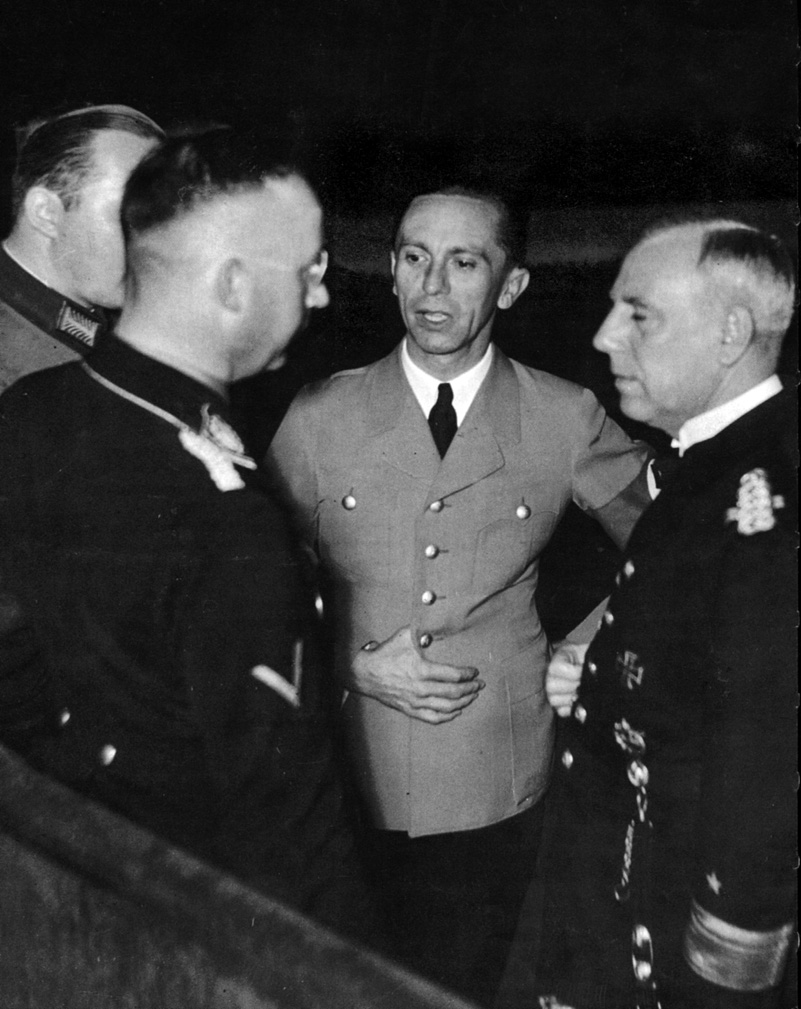
Canaris had a complex relationship with foreign intelligence services. How did he interact with British intelligence, and what impact did these interactions have on the war?
During the months leading up to D-Day, Admiral Canaris’ activities can be best described as hazy and mysterious. He managed to keep Allied intelligence well informed of reports concerning German defenses in Normandy. No one is exactly sure how he stayed in touch with his contacts in London, but it was probably through acquaintances in Spain. No matter how he accomplished it, the admiral sent a good many reports across to England, priceless information involving the German defense build-up on the coast of Normandy.
An American colonel attached to General Eisenhower’s intelligence staff found out exactly how valuable Admiral Canaris had become to the Allied war effort. The officer in question was Colonel James O. Curtis, who was the only American intelligence evaluator on Eisenhower’s staff. The other three officers were British. The main job of an intelligence evaluator was to read and evaluate each and every report that was received – thousands of reports and pieces of intelligence arrived in London during the period leading up to D-Day – and to determine which were genuine and which were unreliable. Colonel Curtis was on very friendly terms with his British colleagues, but he had the feeling that they were not telling him everything – including details about the sources of the information.
Allied intelligence had its own system of grading information, a system that judged each report based on its credibility. The highest quality reports were graded A-1; the lowest were F-6. Colonel Curtis noticed that a surprising number of reports were being graded A-1. A great deal of A-1 material seemed too accurate and detailed to be true, at least to colonel Curtis’ way of thinking. He refused to believe that all the reports were as accurate as his British associates seemed to think. The three British officers were reluctant to divulge the source of the information until Colonel Curtis insisted. He refused to pass the reports along to American planners at Eisenhower’s headquarters until he knew something about their source.
The head of the department, Colonel E.J. Foord, finally decided to let the American in on their secret. He told Colonel Curtis that the source was Admiral Wilhelm Canaris, the head of the Abwehr, and went on to say that this disclosure was to be considered Top Secret: “The only reason that I am telling you this is that we want you to regard this information as being priceless and copper-bottomed.” Colonel Foord explained that only a very select few high-ranking individuals – President Roosevelt, Prime Minister Churchill, General Eisenhower – knew anything about Admiral Canaris’ activities. Colonel Curtis was taken completely by surprise by this revelation. “I was, at first, afraid to go to sleep in case I talked in my sleep,” he said.
Colonel Curtis wrote about Admiral Canaris’ accomplishments: “His most important service was to give us substantially the complete order of battle plans for the German Army, together with the plans they had worked out for coping with the invasion.” Receiving the Wehrmacht’s listing of divisions and regiments was an enormous asset for Allied intelligence. Piecing together that much information would have taken a great deal of time and effort, if the task could have been managed at all. Instead, intelligence agents were able to put that energy to work on other projects. Delivering the order of battle was one of Admiral Canaris’ major achievements. It gave Allied intelligence priceless information on enemy defenses in Normandy, and proved to be a major contribution toward helping Allied forces win the war.
What were the key reasons for Canaris’s eventual downfall, and how was he discovered to be working against the Nazi regime?
The failed assassination plot of July 20, 1944 made Hitler almost obsessively determined to round up everyone who had any connection at all with the plot, no matter how slight. The Gestapo carried out Hitler’s orders with brutal efficiency. Hundreds of German officers were arrested for complicity in the assassination attempt. About 20 percent of them were executed; many were tortured beforehand.
Admiral Canaris was not involved in the plot, but one of the officers taken into Gestapo custody named Canaris as one of the conspirators. Under the stress of Gestapo questioning, this officer, Colonel Georg Hansen, not only implicated the admiral as a member of the July 20 plot, but also identified him as one of the leaders of the anti-Nazi opposition. Colonel Hansen also said that Canaris was directly responsible for smuggling Jews and other “undesirables” out of German-occupied territory, a disclosure that took his interrogators completely by surprise. On the day after this interrogation, Admiral Canaris was arrested by the Gestapo.
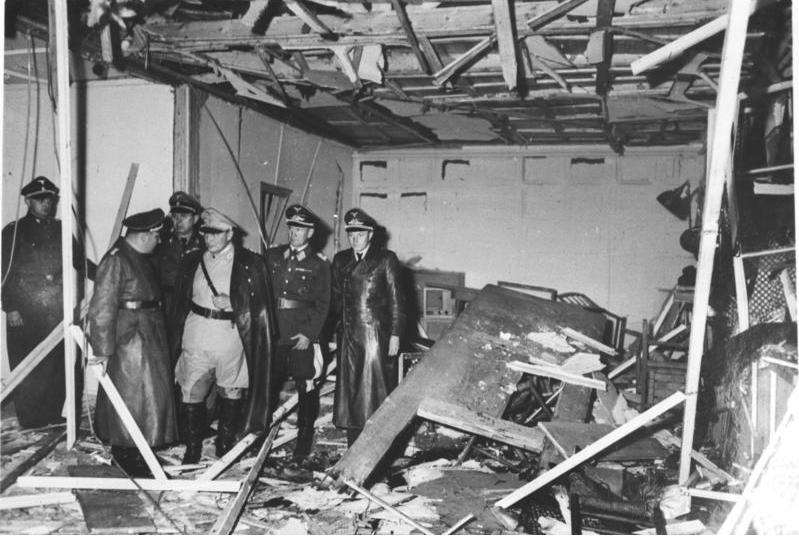
While under arrest, Canaris was regularly questioned by Gestapo agents. Most of these interrogators were specialists in either tricking or intimidating their prisoners into telling them what they wanted to know. But the admiral always managed to avoid answering their questions. He sometimes pretended to be a stupid old man, acting as though he did not understand what the agents were asking him. Sometimes he just sidestepped the questions, or replied with an answer that did not make sense. For months, he frustrated the Gestapo with one ruse after another. But the interrogators never gave up. They always had more questions, and kept coming back.
Not all of the prisoners were as resourceful, or as devious, as Admiral Canaris. One of the suspected conspirators told the Gestapo about some files that were being kept in the town of Zossen, about 20 miles south of Berlin, files that were said to contain valuable information about the anti-Hitler movement. The Gestapo immediately went to Zossen, where they discovered several binders in a safe at the Wehrmacht headquarters building. The binders contained several diaries that recorded – in great detail, and in Admiral Canaris’ handwriting – the activities of the anti-Nazi movement since the 1930s. These diaries supplied the Gestapo with all the evidence they needed to hang Admiral Canaris.
No one knows exactly why Canaris kept such a detailed account for so many years. He gave names, dates, and particulars of just about all the activities of the anti-Hitler conspirators. Possibly it may have been to record events for future historians; maybe it was to keep an official record of the corruption of Hitler and the Nazis for a post-war tribunal. Whatever the reason, the diaries have been one of the great mysteries of Admiral Canaris’ enigmatic life.
Sometime during early April, probably April 4, the diaries were handed over to Adolf Hitler. After reading Admiral Canaris’ comments and observations, Hitler ordered the admiral to be given a quick trial and then hanged. Admiral Canaris had been moved to Flossenbürg concentration camp, about a mile from the Czech border, at the beginning of February. Arranging for a quick trial and execution at Flossenbürg was a routine matter.
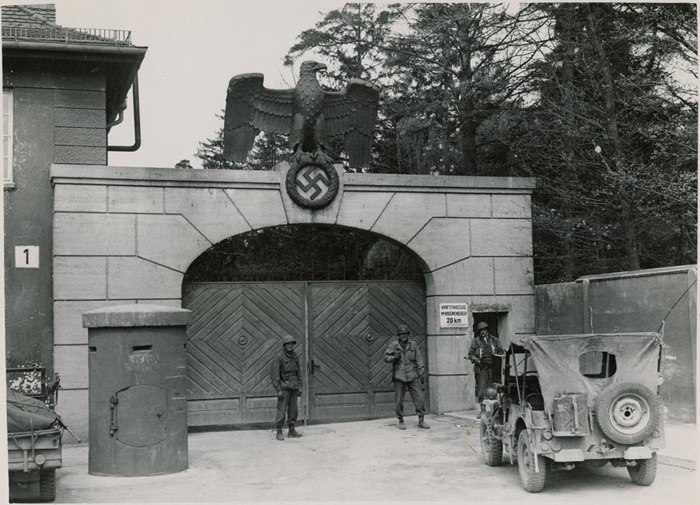
What were Canaris’s personal relationships like with his family and close friends during the height of his double life? How did they perceive his actions?
During the war, Admiral Canaris’ closest friends and associates were members of the anti-Hitler movement. Colonel Hans Oster turned against Hitler in 1934, and was involved in Operation Agular. He would be hanged on the same day as Canaris. Hans von Dohnanyi was also disturbed and angered by the Blomberg-Fritsch incident, and took part in Operation Seven. Ulrich von Hassell had been the German ambassador to Italy; he shared Canaris’ thoughts regarding the persecution of Jews and other outcasts. He unsuccessfully attempted to involve the British government in a plot to overthrow Hitler. General Walter Schellenberg remained on friendly terms with the admiral even though he was a high-ranking officer in German intelligence. The two often went horseback riding together. Admiral Canaris’ relationship with friends can best be described as “cautions.” Every one of his friends and acquaintances realized that one misplaced word regarding the admiral might very well result in the arrest of Canaris and very possibly themselves. Not very much is known about the existence of Canaris’ wife and two daughters. They were apparently not involved in any of the admiral’s anti-Hitler activities and remained in the background of Wilhelm Canaris’ life throughout the war. Both daughters, as well as Canaris’ wife, lived for many years after the war ended.
Can you describe the circumstances of Canaris’s arrest, trial, and execution? What was his legacy following his death?
After Admiral Canaris’ diaries were discovered at the beginning of April 1945, which furnished unquestionable proof that he had been a leader in the anti-Nazi resistance for years, his execution followed very quickly. Adolf Hitler issued the order on April 5. By April 8, Canaris was tried, found guilty of treason, and sentenced to death. Following his trial, the admiral was given a brutal interrogation by his SS guards. The guards beat him with their fists, which left him badly bruised and with a broken nose, and returned him to his cell barely able to walk.
On the following morning, Admiral Canaris was hanged. According to another prisoner at Flossenbürg, he died slowly and horribly. He was actually hanged twice – once with an iron collar around his neck, with the noose placed over the collar. After several minutes, he was taken down while still alive. The iron collar was then removed and he was hanged again. This time, he was left hanging until he was dead. Four other prisoners were also hanged that day. The bodies of all five prisoners were burned on a huge bonfire. The wind blew the cremated remains of Admiral Canaris and the others through the bars of the nearby cell windows.
Since he had become head of the Abwehr, Admiral Canaris managed to smuggle several hundred Jews and other outcasts out of Nazi-occupied territory, right past the Gestapo. He also sent valuable information to the Allies and did everything possible to prevent Adolf Hitler from winning the war. And with a great deal of cunning and an equal amount of good luck, he managed to avoid being discovered. But his luck ran out on July 20, 1944, when he was implicated in the failed Hitler assassination plot. Although he managed to get away with all of his anti-Nazi activities for many years, he was hanged because of a conspiracy in which he played no active part.
Exactly two weeks after Admiral Canaris was hanged, members of the 358th and 359th US infantry regiments arrived at Flossenbürg and liberated the camp. A week after Flossenbürg was liberated, and three weeks after the admiral was executed, Adolf Hitler committed suicide in his Berlin chancellery. He shot himself on April 30; his bride, Eva Braun, swallowed poison. Seven days later, during the early hours of May 7, Germany surrendered unconditionally to the Allied powers and the Third Reich ceased to exist. The end came too late to save thousands of inmates who died in the concentration camps, but the mass murders had finally ended. Admiral Canaris could be well satisfied that he had done his part in saving many political and religious prisoners from places like Flossenbürg.

David Alan Johnson is the author of fourteen books, including The Last Weeks of Abraham Lincoln and Decided on the Battlefield: Grant, Sherman, Lincoln, and the Election of 1864.
Commander Christopher Nelson, USN, is a career naval intelligence officer and a frequent contributor to CIMSEC. The questions and comments here are his own and not necessarily those endorsed by the Department of the Defense or the United States Navy.
Featured Image: Adolf Hitler and his entourage visiting the Eiffel Tower in Paris on June 23, 1940, following the occupation of France by the Nazis. (Photo via German Federal Archives)

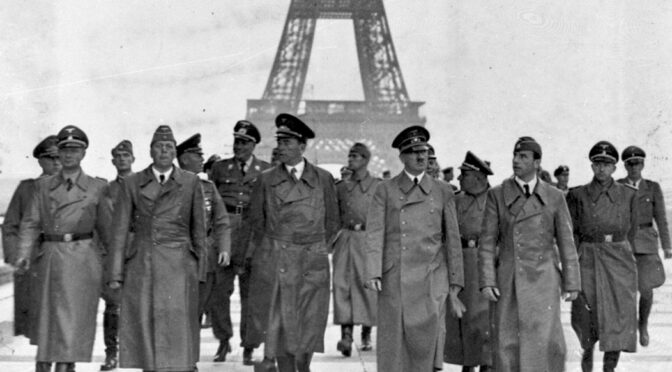
https://cimsec.org/wp-content/uploads/2024/09/ba183de6c4950b6525797e4b3558dd13e329b8e3-768×967.jpg
In the caption you identify ‘Chancellor Joseph Goebbels’. His correct title would have been Reich Minister of Public Enlightenment and Propaganda. He was only chancellor for a day immediately after the death of Hitler, before committing suicide himself. And by that time Admiral Canaris was already long since dead.
While attending the Army Military Intelligence Advanced Course at Fort Holabird MD, (1969) I was tasked to write a paper on Admiral Camaris’ (AC) intelligence activities. My reference material was voluminous and my focus to the subject was limited because of time. I was thrilled to read, finally AC is being recognized for his contributions to the defeat of Hitler. It’s my memory AC was hung and then “garroted “ on a meat hook. Thanks for the interview. I will buy the book.